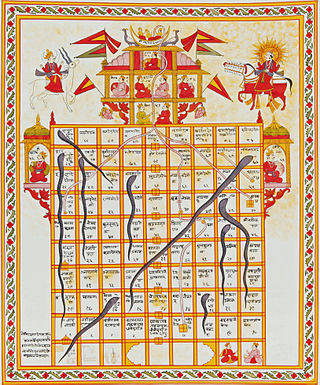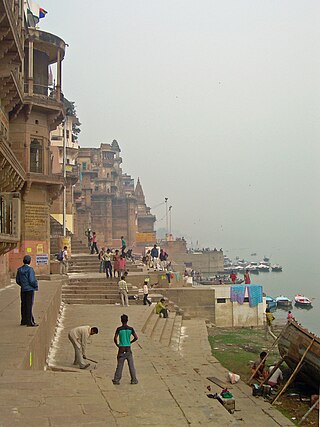
Kabaddi, is a contact team sport played between two teams of seven players. The objective of the game is for a single player on offense, referred to as a "raider", to run into the opposing team's half of the court, touch out as many of their players and return to their own half of the court, all without being tackled by the defenders in 30 seconds. Points are scored for each player tagged by the raider, while the opposing team earns a point for stopping the raider. Players are taken out of the game if they are touched or tackled, but are brought back in for each point scored by their team from a tag or a tackle.

Snakes and ladders is a board game for two or more players regarded today as a worldwide classic. The game originated in ancient India as Moksha Patam, and was brought to the UK in the 1890s. It is played on a game board with numbered, gridded squares. A number of "ladders" and "snakes" are pictured on the board, each connecting two specific board squares. The object of the game is to navigate one's game piece, according to die rolls, from the start to the finish, helped by climbing ladders but hindered by falling down snakes.

Gilli Danda (also spelled Gulli-Danda) also known as Viti Dandu, Kitti-Pul and by other variations, is a sport originating from the Indian subcontinent, played in the rural areas and small towns all over South Asia as well as Cambodia, Iran, Turkey, South Africa, Italy, Poland, and in some Caribbean islands like Cuba. The game is played with two sticks: a large one called a danda , which is used to hit a smaller one, the gilli . Other than using a smaller target stick, rather than a ball, it bears many similarities to bat and ball games such as cricket and baseball.

Tag is a playground game involving one or more players chasing other players in an attempt to "tag" and mark them out of play, usually by touching with a hand. There are many variations; most forms have no teams, scores, or equipment. Usually, when a person is tagged, the tagger says, "Tag, you're 'It'!" The last one tagged during tag is "It" for the next round. The game is known by other names in various parts of the world, including "running and catching" in India and "catch and cook" in the Middle East.

Ball badminton is a sport native to India. It is a racket sport game, played with a yellow ball made of wool, on a court of fixed dimensions divided by a net. The game was played as early as 1856 by the royal family in Tanjore, the capital of Thanjavur district in Tamil Nadu, India. It enjoys the greatest popularity in India. Ball badminton is a fast-paced game; it demands skill, quick reflexes, good judgment, agility, and the ability to control the ball with one's wrist.

Chowka Bara or Ashta Chamma is a two- or four-player board game from India. This game is an example of a “fully observable” system that has an element of chance introduced by the roll of special dice and an element of strategy. While traditionally played with 4 or 6 cowry shells, dice can also be used.

Pallanguli, or Pallankuli, is a traditional ancient mancala game played in South India, especially Tamil Nadu and Kerala. This game was later introduced to Karnataka and Andhra Pradesh in India, as well as Sri Lanka and Malaysia. The game is played by two players, with a wooden board that has fourteen pits in all (hence, it is also called fourteen pits, or pathinālam kuḻi. There have been several variations in the layout of the pits, one among them being seven pits on each player's side. The pits contain cowry shells, seeds or small pebbles used as counters. There are several variations of the game depending on the number of shells each player starts with.
Kurumaddali Lakshmi Narasimha Rao, better known by his stage name Suthi Velu, was an Indian actor and comedian known for his works in Telugu cinema. He has acted in more than 200 films, and won four state Nandi Awards.
Four corners is a children's game, often played in elementary schools. The object of the game is for players to choose corners of the room and not get caught by the designated "It" player until they are the last remaining participant.
Eedara Veera Venkata Satyanarayana was an Indian film director, screenwriter and producer. He directed a total of 51 films in Telugu and Hindi and introduced many actors to Telugu cinema. He was well known for making comedy and melodrama films. In 2000, he established his own production company, E. V. V. Cinema. He died in 2011.

Vijaya Krishna Naresh, known mononymously as Naresh, is an Indian actor, politician and social activist known for his works predominantly in Telugu cinema and television. He began acting as a child in 1970, and starred in around 200 films in a variety of roles as both lead and supporting actor. Some of the box office successes he appeared in were Rendu Jella Sita (1983), Sreevariki Prema Lekha (1984), Sri Kanaka Mahalaxmi Recording Dance Troupe (1987), Manasu Mamatha (1990), Chitram! Bhalare Vichitram!! (1991) and Jamba Lakidi Pamba (1993). He also received the title H.E. and received a PhD in arts from the United Nations ICDRHRP group.
The Lambs and Tigers Game locally referred as the Game of Goats and Tigers or Pulijudam, is a strategic, two-player leopard hunt game that is played in south India. The game is asymmetric in that one player controls three tigers and the other player controls up to 15 lambs/goats. The tigers 'hunt' the goats while the goats attempt to block the tigers' movements.

Seven stones is a traditional game from the Indian subcontinent involving a ball and a pile of flat stones, generally played between two teams in a large outdoor area.

Nalugu Rallu Aata is a very ancient traditional outdoor four-player game played by the children of the past generation, until the late 1960s and 1980s in many rural districts of Andhra Pradesh State. The origin and the birth of this game is unknown. Today this game has completely vanished due to urbanization and invasion of western games.
Traditional games of Andra Pradesh, like many traditional games played in India, involve games which are played mostly by children. These games may also be enjoyed by other people of any age, as it reminds them of their childhood. Despite the advent of computers and technology, with children preferring to spend their times indoors, these games are still very popular in the Andhra Pradesh. They are also played in great and small towns all over India and Pakistan especially in Andhra Pradesh, Tamil Nadu, Punjab, as well as Cambodia and Italy..
Telugu Christians or Telugu Kraistava are a religious community who form the third-largest religious minority in the Indian states of Andhra Pradesh and Telangana. According to the Census of India, there are over a million Christians in Andhra Pradesh, constituting 1.51% of the state's population, although a decrease from the 1971 census figure which was 2%, as a result of low birth rates and emigration. Most Telugu Christians are Protestant, belonging to major Indian Protestant denominations such as the predominant Anglican Church of South India, Pentecostals such as Assemblies of God in India, India Pentecostal Church of God, The Pentecostal Mission, the Andhra Evangelical Lutheran Church, the Samavesam of Telugu Baptist Churches, the Salvation Army and several others. There also is a significant number of Roman Catholics and Evangelicals. Although the Franciscans of the Roman Catholic Church brought Christianity to the Deccan area in 1535, it was only after 1759 AD, when the Northern Circars came under the rule of the East India Company, that the region opened up to greater Christian influence. The first Protestant missionaries in Andhra Pradesh were Rev. Cran and Rev. Des Granges who were sent out by the London Missionary Society. They set up their station at Visakhapatnam in 1805 AD. Regions with significant populations of Telugu Christians include the erstwhile Northern Circars, the coastal belt and the cities of Hyderabad and Secunderabad. Telugu Christians have one of the highest literacy and work participation figures and most even male-to-female ratio figures among the various religious communities in the state.
Many sports are played by the people of Tamil Nadu including both traditional sports and sports from other countries.
Sports in Andhra Pradesh has its own importance, where many sporting personalities were into limelight. The Sports Authority of Andhra Pradesh (SAAP) undertakes the sports development activities such as construction of stadiums, establishment of sports academies and other sporting related activities. The sports infrastructure have increased tremendously by improving infrastructure in outdoor and Indoor stadiums, play fields, sports academies, sports equipments etc. Sports such as kho kho, kabaddi are played mostly in Andhra Pradesh.Most sports players from Andhra pradesh represent national level competitions and very few international competitions.
Paandi, also known as Pandi or Nondi, is a regional hopscotch game traditionally played in rural parts of India, Sri Lanka and also in certain other countries with large numbers of immigrant Indians. The game is played only for leisure and does not involve serious rules or regulations. It is also called as Tokkudu Billa or Tangidi Billa in Andhra Pradesh and Kunte Bille in Karnataka

India has several traditional games and sports, some of which have been played for thousands of years. Many of these games do not require much equipment or playing space. Some traditional Indian games are only played in certain regions of India, or may be known by different names and played under different rules and regulations in different regions of the country. Many Indian games are also similar to other traditional South Asian games.











